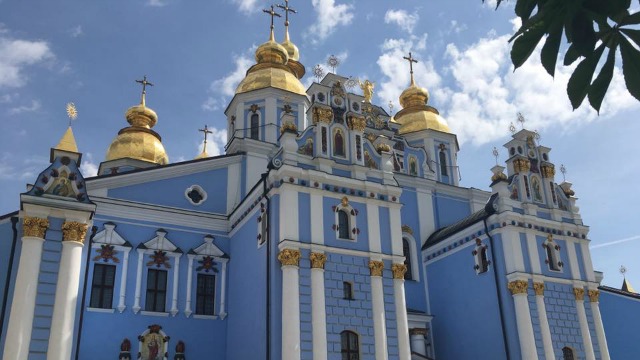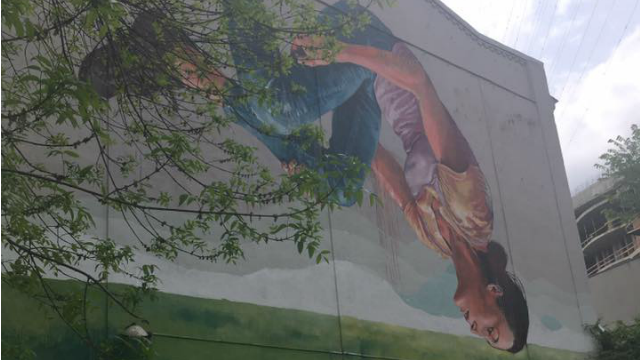Like many of Europe’s Eastern nations, Ukraine is currently suffering from a major PR problem. Although viewed more sympathetically by most of the West compared to their neighbours in Russia, the former Soviet state still tends only to attract mainstream headlines for negative reasons – be it local political upheavals, international conflicts, economic woes or issues around human rights.
In coming to Kyiv for this year’s Eurovision Song Contest, I was interested in exploring how the Western perception of Ukraine’s troubled capital would square up to the reality. So, faced with a sunny Monday morning free from Song Contest commitments, I decided to join a walking tour to get a proper feel for the city.
Walk On Water
One of the first things you notice about Kyiv is how big everything seems. Opulent churches and palaces dominate the city skyline, only challenged in scale by the numerous modern skyscrapers and luxury hotels that are fast rising up alongside them. My tour guide bemoans Ukraine’s lack of resistance to this new breed of architecture, which has already been built at a significant cost to the city’s more historic buildings.

Kyiv’s ancient capital boasts awe-inspiring historic architecture
The city is also much greener and cleaner than you might expect, with beautifully preserved parks providing a blissful walking route around the old town, accompanied by a wide variety of street art and local curios. That being said, tourists would be wise to politely but firmly avoid the advances of local bird handlers, who will thrust suspiciously docile white pigeons onto your arms, shoulders or head, and then charge up to 800 UAH (roughly £25) for the privilege.
Although billed as a tour through Kyiv’s past, my guide was also keen to showcase the city’s modern attractions, particularly a series of awe-inspiring murals from local and international artists; many of which pay tribute to the 2014 revolution which provided the rest of the world with a haunting and unfortunately enduring image of the capital as a city in flames.

Modern murals add a different flavour to Kyiv’s rich tapestry of cultural highlights.
Three years on, while there’s a noticeable police presence in most crowded areas, the city feels strikingly calm, friendly and above all, safe. The guide admits that before Eurovision, English-language tourists have tended to avoid Kyiv, so the influx of fans offers a refreshing chance to show the city in a different light. She’s keen to learn how my expectations and prejudices compare with my experiences so far. After several years in countries that can afford to take their status as popular travel destinations somewhat for granted, there’s something quite humbling about visiting a capital that has just as much to offer as Stockholm and Vienna, but one that comparably few people will ever take the time to investigate.
As we wind down the tour with a stroll through St. Andrew’s Street, commonly known as ‘Montmartre in Kiev’, a local television crew requests an interview – also on the hunt for western tourists willing to share their experiences of the city. I’m happy to oblige, deciding to remove my shoulder cast to avoid giving the wrong impression. In many respects Ukraine still has a long road ahead, but based on my experiences so far, the capital has a lot of positive stories to tell. Having already helped transforms the country’s self image once back in 2004-2005, perhaps Eurovision can once again help to provide the platform they need to change the conversation…
If fans on the ground would like to experience a historic tour of Kyiv’s ancient quarter, I would wholeheartedly recommend my tour guide Stacy Lazo. Mine was priced at 200UAH – approximately 7 Euro. Drop me an (email) and I’ll be happy to put you in touch – John.









